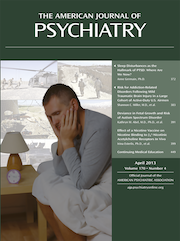Risk for Addiction-Related Disorders Following Mild Traumatic Brain Injury in a Large Cohort of Active-Duty U.S. Airmen
Abstract
Objective
Military personnel are at increased risk for traumatic brain injury (TBI) from combat and noncombat exposures. The sequelae of moderate to severe TBI are well described, but little is known regarding long-term performance decrements associated with mild TBI. Furthermore, while alcohol and drug use are well known to increase risk for TBI, little is known regarding the reverse pattern. The authors sought to assess possible associations between mild TBI and addiction-related disorders in active-duty U.S. military personnel.
Method
A historical prospective study was conducted using electronically recorded demographic, medical, and military data for more than a half million active-duty U.S. Air Force service members. Cases were identified by ICD-9-CM codes considered by an expert panel to be indicative of mild TBI. Outcomes included ICD-9-CM diagnoses of selected addiction-related disorders. Cox proportional hazards modeling was used to calculate hazard ratios while controlling for varying lengths of follow-up and potential confounding variables.
Results
Airmen with mild TBI were at increased risk for certain addiction-related disorders compared with a similarly injured non-mild TBI comparison group. Hazards for alcohol dependence, nicotine dependence, and nondependent abuse of drugs or alcohol were significantly elevated, with a consistent decrease over time.
Conclusions
A novel finding of this study was the initial increased risk for addiction-related disorders that decreased with time, thus eroding war fighter performance in a military population. Moreover, these results suggest that mild TBI is distinguished from moderate to severe TBI in terms of timing of the risk, indicating that there is a need for screening and prevention of addiction-related disorders in mild TBI. Screening may be warranted in military troops as well as civilians at both short- and long-term milestones following mild TBI.



